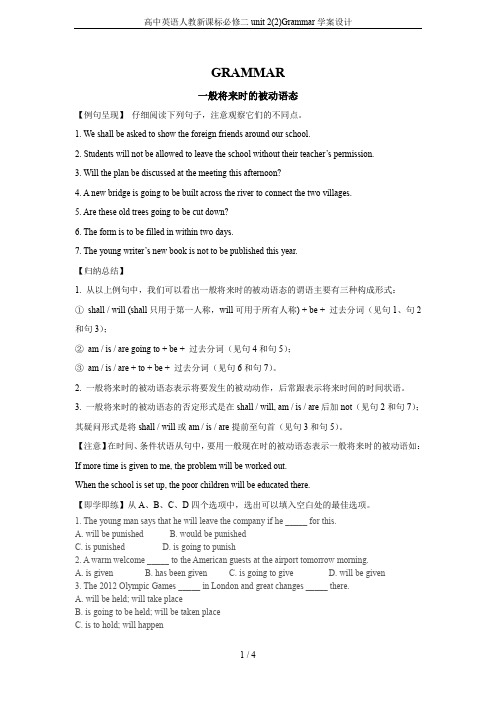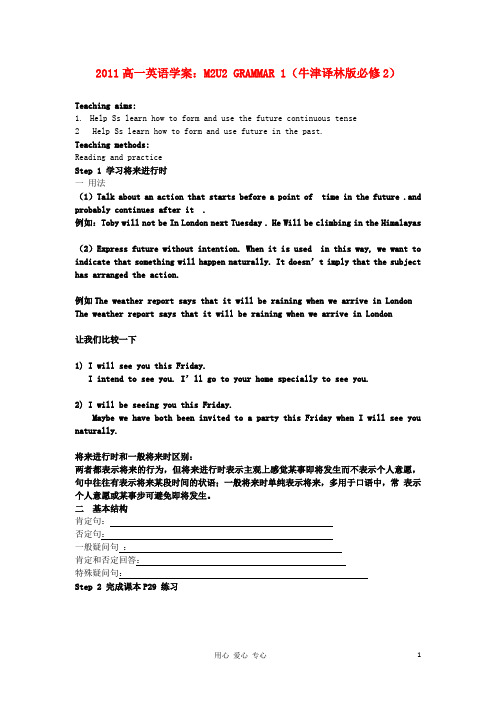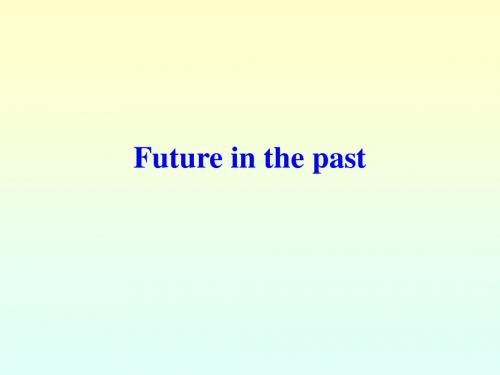m2u2 grammar
- 格式:ppt
- 大小:908.50 KB
- 文档页数:51


GRAMMAR一般将来时的被动语态【例句呈现】仔细阅读下列句子,注意观察它们的不同点。
1. We shall be asked to show the foreign friends around our school.2. Students will not be allowed to leave the school without their teacher’s permission.3. Will the plan be discussed at the meeting this afternoon?4. A new bridge is going to be built across the river to connect the two villages.5. Are these old trees going to be cut down?6. The form is to be filled in within two days.7. The young writer’s new book is not to be published this year.【归纳总结】1. 从以上例句中,我们可以看出一般将来时的被动语态的谓语主要有三种构成形式:①shall / will (shall只用于第一人称,will可用于所有人称) + be + 过去分词(见句1、句2和句3);②am / is / are going to + be + 过去分词(见句4和句5);③am / is / are + to + be + 过去分词(见句6和句7)。
2. 一般将来时的被动语态表示将要发生的被动动作,后常跟表示将来时间的时间状语。
3. 一般将来时的被动语态的否定形式是在shall / will, am / is / are后加not(见句2和句7);其疑问形式是将shall / will或am / is / are提前至句首(见句3和句5)。

2011高一英语学案:M2U2 GRAMMAR 1(牛津译林版必修2)Teaching aims:1.Help Ss learn how to form and use the future continuous tense2 Help Ss learn how to form and use future in the past.Teaching methods:Reading and practiceStep 1 学习将来进行时一用法(1)Talk about an action that starts before a point of time in the future .and probably continues after it .例如:Toby will not be In London next Tuesday . He Will be climbing in the Himalayas(2)Express future without intention. When it is used in this way, we want to indicate that something will happen naturally. It doesn’t imply that the subject has arranged the action.例如The weather report says that it will be raining when we arrive in London The weather report says that it will be raining when we arrive in London让我们比较一下1) I will see you this Friday.I intend to see you. I’ll go to your home specially to see you.2) I will be seeing you this Friday.Maybe we have both been invited to a party this Friday when I will see you naturally.将来进行时和一般将来时区别:两者都表示将来的行为,但将来进行时表示主观上感觉某事即将发生而不表示个人意愿,句中往往有表示将来某段时间的状语;一般将来时单纯表示将来,多用于口语中,常表示个人意愿或某事步可避免即将发生。

将来进行时一、将来进行时的形式:将来进行时由“will/shall be+现在分词”构成二、将来进行时的用法:将来进行时表示在将来某一时间内正在进行的动作。
将来进行时有很强的推测性,因此人们往往在以下几种场合中使用它:1. 表示将来某一时间正在进行的动作,一般带状语。
例如:What will you be doing at this time next Monday?下周一的这个时候你将做什么了?When he comes to my house tomorrow, I____________(写)the report.Daniel’s family ____their holiday in Huangshan this time next week. (2009 安徽)are enjoying B. are to enjoy C. will enjoy D. will be enjoying2. 表示现在正在进行的动作,但这个动作会延续到将来。
例如:I wonder if it will still be raining this afternoon.我想知道今天下午是否还会一直下雨。
I think that she ____________(work)on this experiment until next morning.我想她会一直在做这个实验直到第二天早上。
3. 表示预定的将来动作或对将来的预测。
例如:The weather report says that it ____ when we arrive in Wuxi City tomorrow afternoon.A.is snowingB. snowsC. will be snowingTomorrow I___________ to Bombay.明天我将飞往孟买。
After you take the medicine, you _________ much better.吃完药后,你会感觉好很多。

